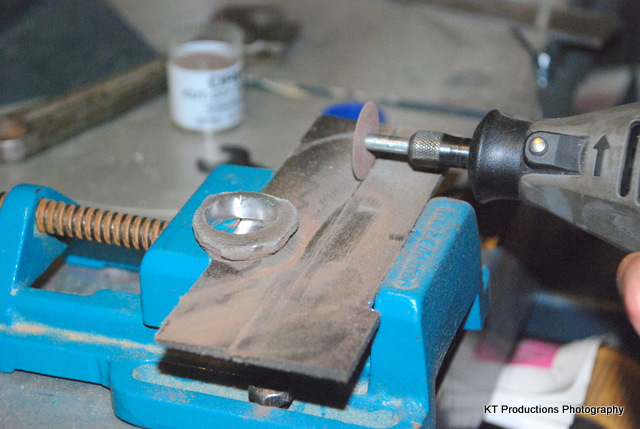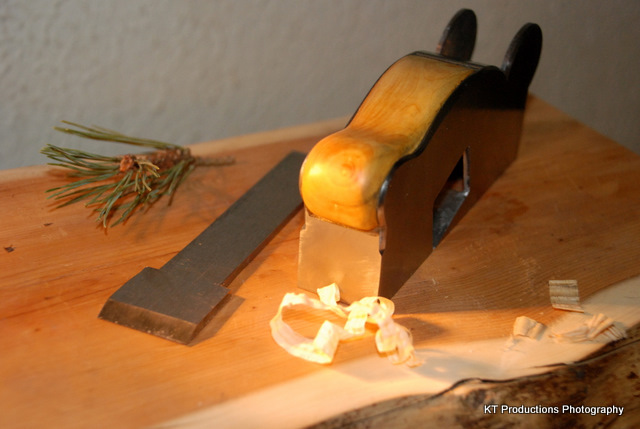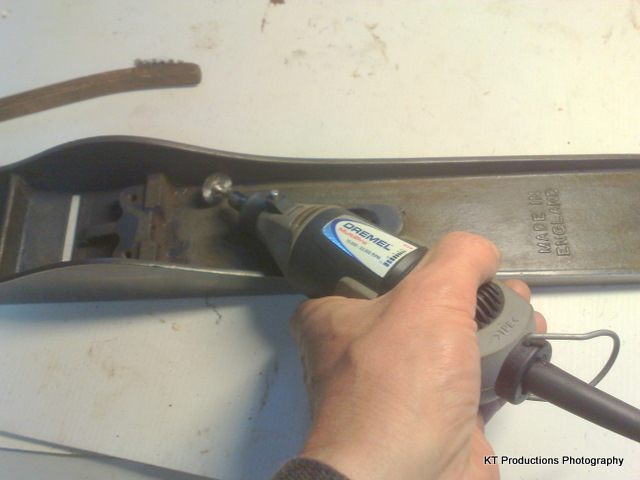@ Alan 2001,
Hope the following is not too long – lots of people have given me lots of v. helpful info on here in the past so I’m pleased to return the favour on some stuff I know a bit about.
Not being a “proper woodworker” (I just do bits of wood mangling n bits of metal bashing) I can help you with some of the things in your set. As someone has already said, your set contains “stuff” that covers just about every area of hobby work. It’s therefore unlikely that you’ll find a use for all of the items unless your interests and activities are v broad indeed. And I’m definitely NOT saying that any of the following is gospel truth and the “proper” way to do stuff. But here’s what works for me (using your numbering in the original photo):
Items 1 & 2 – these are EXCELLENT aluminium oxide “sanding drums” ideal for tackling all sorts of metal and wood working cleaning up and shaping jobs (e.g. just today I was cleaning the corrosion out of the inside of some metal water pipe). Just mount them onto your item numbers (can’t quite see the numbers, looks like items 31 & 32, but anyway, they’re above your number 5). BTW, if your’s are anything like mine you’ll find it very useful to remove the rubber drum from the shaft, fit a big washer (same dia as the rubber drum dia), then re-fit the drum, then fit another washer on top. When changing the sanding drums themselves (they wear out pretty quickly depending on the material you’re working on) remove washer/drum/washer from the shaft, then remove/replace the sanding drum (in reverse order of course!). As said they often wear out pretty quickly and I find it handy to have a good stock of both sizes on hand all the time. Here (Switz) the official Dremel ones are cheap enough – I cant speak about UK prices except to say that I THINK Axminster have them in stock, and just recently Arc Euro Trade had packs of the small ones on special offer. (
http://www.arceurotrade.co.uk – an EXCELLENT company in all respects - usual disclaimers). I certainly wouldn’t mess about with flea bay for stuff like this.
Item 14 – personally I really disagree that the flap wheels are useless – I think they’re EXCELLENT. As always, it depends what you’re using them for and on what material. I frequently use them for final shaping on model aircraft bits (not just balsa but ply, EP, GRP) and incidentally, they work well on real thick ply - half inch & above - multi-lamination marine ply. Again here in Switz the “official” Dremel (and Proxon) one are cheap enough, and come in various grades; and again, I THINK Arc Euro has them. BTW, like Items 1 & 2 above, to get best results you’ll find high rpm (20,000 if your machine gives it) and LIGHT hand pressure will produce the good results referred to above.
Items 9, plus (can’t see the number, next to items 1) plus (can’t see – between 11 & 16) - are all polishing mops. They work best on soft metals like ali n brass, but if you keep at will also produce a nice “engine turned effect” on mild steel surfaces. They mount (screw on to) item number (looks like 42) and are used in conjunction with the “India rubber” (which you mention in your text but which I can’t see in your pic). Take that tub of hard brown stuff that you mention (is it item 49 in your pic?), prise a little bit out with a matchstick or lolly stick and spread it in lumps over the metal you want to polish. Soften it (like your’s, mine is really too hard to call a paste) with your finger tip and a drop or two of metal polish (“Brasso” is ideal), or if not available, a VERY light oil or paraffin. Start off with the rubber then work “down” to the white polishing mops (item 9, or the big one, or the “cylindrical” one, according to the job size/shape). Then finish off with a suitable brush (item 37, or the 2 others to the right of 37 – again I can’t see those numbers properly, sorry). Note that all the white mops become loaded up with the “paste” (it’s actually jeweller’s rouge) and if you’re trying for a nice, highly-polished finish on some metal (e.g. the plates of a clock) then they can really be used one time only (but the brushes can be washed out in acetone and hot soapy water). The mops and rubbers are available as official Dremel and Proxon spares but they’re pricey (here anyway), so I buy mine from someone like Chronos UK (
http://www.chronos.ltd.uk – again excellent service and again usual disclaimers).
Items 31 (I think) through 36 – steel and brass wire brushes. Personally I don’t like these much (there’s plenty of better items in the “normal” DIY emporium) but they can be useful in getting into v small/tight areas sometimes. If you do use them ever, DO, PLEASE use good eye shields and gloves – on the rare occasions I’ve used mine they shed those tiny wire “hairs” one at a time) and the idea of getting one of those in the eye makes me shudder – I’ve already had the odd one in my hand n that’s bad enough, ‘cos those wires are very thin). It ‘urts like ‘ell!
Items 10 (and maybe in the “tub”, 11?) are, IMHO, the real “dogs danglers”. They are abrasive cut-off wheels (the tub 11 has the thick ones in it I think – rather less useful) and these are used just like shown by Jimi43 in his first pic. Exactly as he says, keep the rotating disc square in the kerf at all times and you’ll be pleasantly surprised how quickly they’ll cut stuff like hard piano wire, silver steel, bolts, screws, etc. But as Jimi says, they can shatter quite easily (especially until you get used to using them) and in any case they shed loads of fine abrasive dust, so eye protection is essential. Do note that the harder the material being cut the quicker they wear down (obviously). They mount onto the mandrel (2nd from R from the “screw” mandrel used for polishing mops), and do note the 2 tiny fibre washers that come with the mandrel – fit one above and one below the cut off disc when mounting it EVERY time. Like some of the others above, the official Dremel and Proxon items are cheap enough (here anyway) – I always make sure I’ve got a good stock of them on hand. I’d think any DIY emporium in UK, plus probably the 2 firms named above, will have them on the shelf. I’d think they’re hardly worth the bother and risk of a flea bay buy.
Items 31 through 39 - diamond (on the LH side) and tungsten-steel (on the RH side) “dental burrs” of various shapes. I doubt they’d be much good for “real” woodworking, but I use mine sometimes on stuff like model aeroengine internals, GRP, hard plastic, etc. IF they are “proper” diamond and “proper” tungsten-steel then they are V expensive to replace. Again Chronos (as above) can probably help. I once cadged a nice set (un-used) from my Dentist so I’ve probably got enough to last the rest of my lifetime - as said, personally I use them only rarely, but when needs must they will remove metal pretty quickly, even “hard” metal like cast iron and weld spatter.
Items 18, 19, 20 – mounted stones of various grades. Personally I use numbers 18 and 20 (when it’s not worn oval like I think yours is) quite a lot, primarily for sharpening stuff like scissors, garden shears, lawnmower blades, etc. BUT do please note I was lucky enough to have SWMBIO buy me a “proper“ Dremel set for Crimble a few years back and that included a little “jigging fixture” which can use those stones. Dependant on your model the Dremel jig MAY fit, and again, here at least they are cheap enough (and come complete with a mounted stone of the “pink/red” variety). To that you can add (as a separate buy() a “grey” mounted stone if you’re going to be doing “heavy” work like grinding big stone gouges out of lawnmower blades – the “pink” stones are for final “finish-grinding” only. I do not agree with someone else’s statement that they’re useless and wear away too quickly – they’re ideal for exactly what they’re designed for, as above. If you want to grind half inch chunks of hard metal off at one time then go and buy a Bridgeport mill or a Schlieren surface grinder! Use the max speed you possibly can and keep the tool pressure LIGHT and you’ll find they do the job very well (IMHO).
All the other items in your pic are unknow to me, sorry.
Quite a lot of people ridicule Dremel, Proxon, and their cheap clones, and certainly none of them have the sort of power you’ll find in a big DeWalt drill (for example),. But used “sensibly” and with a bit of thought about what you’re trying to do on what sort of material they definitely do have an (important) place in the workshop – IMHO anyway.
I hope the above is of some help and not “teaching granny to suck eggs”.
Krgds & good luck
AES











